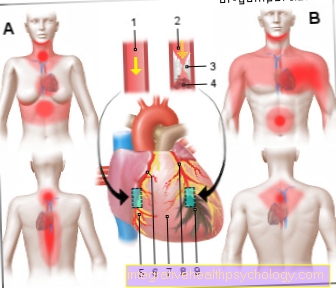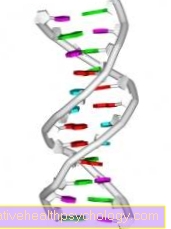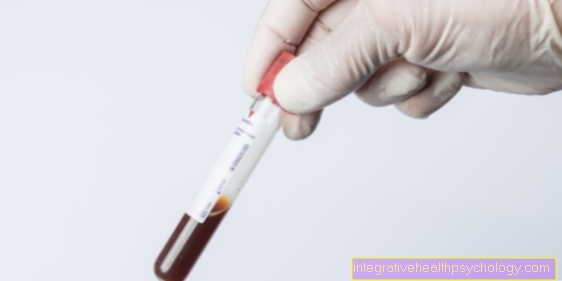Clopidogrel
definition
Clopidogrel is a drug in the anti-platelet family (Antiplatelet drugs). The drug thus affects blood clotting, similar to aspirin. Its purpose is to prevent the blood platelets (thrombocytes) from combining and forming clots.
For those who are particularly interested, read more on the topic blood

Indications
Clopidogrel is used for various clinical pictures that have an increased risk of being in the blood clot (Thrombi) train. These clots are potentially dangerous as they can be found in Blood vessels can fix and thus a Circulatory disorder can evoke.
The consequence of the circulatory disorder can be so-called atherothrombotic events occur to a stroke or Heart attack being able to lead. From this derive the following application areas from: Clopidogrel used to prevent blood clots when the patient is on calcified arteries (arteriosclerosis) suffers, one Heart attack or stroke has suffered or under the peripheral arterial disease (PAD) suffers.
Will continue Clopidogrel applied when the patient has an episode severe Chest pain as part of a "unstable angina pectoris“Or had a heart attack.
Clopidogrel is also prescribed when patients have one Stent (Stent) to keep the narrowed artery open. Here, clopidogrel is often given in combination with ASA (acetylsalicylic acid).
Effect / active ingredient
The active substance Clopidogrel is initially not active in the body. Only when Clopidogrel in the liver has been converted, it can develop its function.
To the effect of Clopidogrel To understand one must first look at the function of the Platelets clarify. Platelets are used in the body to leaks or injuries to seal. This is achieved by the fact that the platelets collect after activation and thus close the injury in the vessel.
It comes to one Vascular injury, messenger substances are released which on the one hand attract and on the other hand activate the blood platelets. For the activation of the blood platelets is among other things the Messenger substance ADP (Adenosine diphosphate) responsible and ensures the accumulation of blood platelets. The drug Clopidogrel prevents the accumulation of ADP on the platelets and thus prevents the platelets from aggregating. Blood clotting is thus suppressed.
Side effects
Frequent Side effects of clopidogrel concern the Gastrointestinal tract. It can too stomach pain, heartburn and Indigestion come.
As the drug poses the risk for unwanted bleeding increased, need patients with existing bowel and / or Stomach ulcer be carefully monitored by the doctor.
It can also happen that Nausea and vomiting occur. Furthermore are Constipation and Flatulence to observe.
Clopidogrel can also neurological symptoms cause. It can too Headache, drowsiness, dizziness and abnormal sensations such as tingling and numbness come. A doctor should be consulted, especially if abnormal sensations occur. It rarely happens Dizziness or loss of balance.
Rashes and itching, some of which can also be attributed to an allergy to the drug, are rare.
Through the intentional, anticoagulant effect The bleeding time is prolonged in the event of an injury or cut. Bleeding of all types can also occur. Nosebleeds, bleeding gums or, rarely, dangerous cerebral bleeding can occur. Blood-thinning medication is also noticeable if you bump into it. Thus, when taking Clopidogrel increased bruising.
Additionally can Clopidogrel Cause changes in the blood count such as a lack of platelets or white blood cells. These changes apply to those that are carried out regularly Blood test during therapy with Clopidogrel on. In this case, the attending physician adjusts the therapy.
Hair loss due to clopidogrel
Hair loss is a rare side effect of Clopidogrel. In the case of new hair loss and simultaneous use of clopidogrel, a conversation and a subsequent examination by the doctor can determine whether the hair loss is triggered by the active ingredient or whether there is another organic cause.
Fatigue from clopidogrel
Clopidogrel can cause tiredness or drowsiness. It is not always clear why fatigue occurs. In any case, changes in the blood count caused by clopidogrel can be responsible for the tiredness. But similar to hair loss, there can be many different causes for fatigue.
Stopping before surgery
The discontinuation of Clopidogrel carries the risk of being unintentional Blood clots form and so-called thromboembolic events how Heart attacks or strokes occur. However, since there is always a risk of bleeding during an operation, must Clopidogrel in most cases at least 5 days be discontinued before the procedure. In interventions with a low risk of bleeding, the attending physician decides whether the blood-thinning therapy with clopidogrel should either be continued or replaced by another blood thinner (e.g. heparin) during the operation, or the use of an anticoagulant should be completely interrupted.
Definitely should be from the patient no independent withdrawal done by clopidogrel. Due to the increased risk of clot formation with serious consequences such as heart attack or stroke, a doctor should always be consulted.
Sneak out
In a conversation, the doctor will make recommendations like that Clopidogrel is best to stop. Usually you can stop taking Clopidogrel be discontinued immediately without paying attention to a dose reduction. After 5 to 7 days after finally stopping Clopidogrel the blood-thinning effect is abolished, since the previously inhibited platelets have been replaced by new ones. The new platelets can function normally.
Since in very rare cases a so-called "Rebound phenomenon" was observed - i.e. after discontinuation of Clopidogrel a increased risk of clot formation insisted - should be discontinuing Clopidogrel be done exactly in consultation with a doctor.
Half-life
Clopidogrel binds to a place on the Platelets, on which in the physiological sense normally the ADP would bind. Blocking this receptor through Clopidogrel is irreversible. It means that Clopidogrel remains at the binding site until the platelet dies. As a result, the blood platelets are impaired for their entire life and no longer able to clot. However, platelets only survive for 8-12 days. Therefore, with the formation of new platelets, the blood's ability to clot increases again.
The half-life of Clopidogrel amounts 6 hours. That means 6 hours after taking Clopidogrel 50% of the active substance is still present in the blood and can thus inhibit newly formed blood platelets.
















.jpg)












